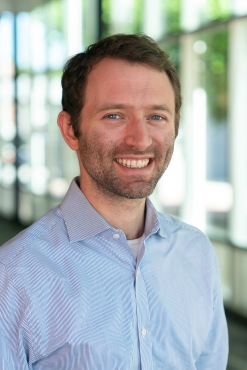Study Finds Children Who Live Close to Highly Trafficked Roads Have Higher Risk of Developing Atopic Dermatitis
DENVER, CO —
The negative effect of traffic-related air pollution on respiratory health has been well-studied, but researchers at National Jewish Health are now examining how increased pollutants impact another health area – allergic disease. In a recent study, researchers found that highly trafficked roads in the state of Colorado have adverse ramifications on skin health in children, raising the risk of developing atopic dermatitis. Children living at least a thousand meters away from highly trafficked roads had lower odds of having atopic dermatitis than those living within 500 meters. The study results were just published in the Journal of Allergy and Clinical Immunology: In Practice.

"These findings highlight the importance of having environmental interventions designed to decrease exposure to traffic in young children,” said Jessica Hui, MD, senior author of the study, and a pediatric allergist and immunologist at National Jewish Health.
Atopic dermatitis, or eczema, commonly occurs in children and can lead to a progression of allergic diseases, also known as the atopic march. Nearly 10 million children in the U.S. have atopic dermatitis, and one-third have moderate to severe disease.
“The surface of the skin in children with atopic dermatitis is leaky and prone to exposure to environmental hazards, which can lead to an allergic inflammatory response, possibly resulting in food allergies, asthma and other problems,” said Michael Nevid, MD, first author of the study, and a pediatric allergist and immunologist at National Jewish Health.
For the study, researchers reviewed charts of patients 0-18 years of age who had been seen at National Jewish Health in Denver, from 2008 to 2021. Residential distances from highly trafficked roads for people with atopic dermatitis and controls without atopic dermatitis were calculated. Highway and local road traffic data was obtained from the Colorado Department of Transportation. Highly trafficked areas were defined as roads or highways with annual average daily traffic of over 10,000 vehicles.
National Jewish Health is the leading respiratory hospital in the nation delivering excellence in multispecialty care and world class research. Founded in 1899 as a nonprofit hospital, National Jewish Health today is the only facility in the world dedicated exclusively to groundbreaking medical research and treatment of children and adults with respiratory, cardiac, immune and related disorders. Patients and families come to National Jewish Health from around the world to receive cutting-edge, comprehensive, coordinated care. To learn more, visit njhealth.org or the media resources page.
Media Resources
We have many faculty members, from bench scientists to clinicians, who can speak on almost any aspect of respiratory, immune, cardiac and gastrointestinal disease as well as lung cancer and basic immunology.
Media Contacts
Our team is available to arrange interviews, discuss events and story ideas.
- Jessica Berry
303.398.1082 office
303.807.9491 mobile
berryj@njhealth.org - Adam Dormuth
303.398.1002 office
970.222.5034 mobile
dormutha@njhealth.org
